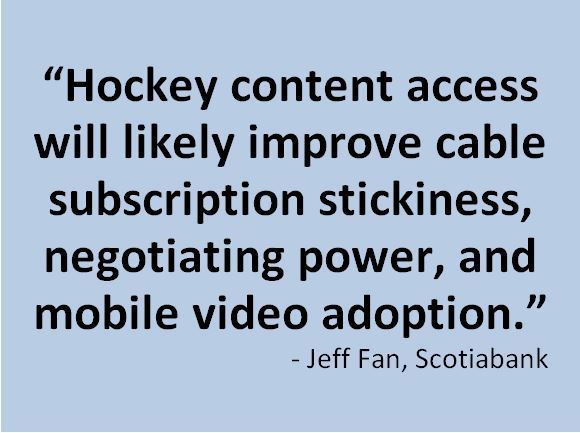
TORONTO – Rogers’ new 12-year $5.2 billion broadcast and multimedia deal with the NHL may have grabbed headlines across the country, but will likely have little impact on the company’s bottom line, say industry analysts.
Rogers Communications executives said Tuesday the deal will be immediately EBITDA-accretive to its Media division, predicting an influx of $25 – $35 million in the first year, rising to more than $60 million per year after that. But Dvai Ghose, managing director/head of research for Canaccord Genuity, pointed out that Rogers Media only accounted for 4% of the parent company’s 2013 third quarter adjusted EBITDA.
In a note to clients, Ghose noted that content ownership has to date has had no “discernible positive impact” on vertically integrated companies like Rogers, Bell or Shaw, and in turn, has had little negative impact on pure play BDUs like Telus, Cogeco and MTS.
“The irony is that Bell TV, Telus TV, Cogeco Cable, Shaw and Videotron customers will have equal access to watch NHL games as Rogers Cable customers due to CRTC rules against content exclusivity”, he wrote. “Wireless broadcast exclusivity is also not allowed under CRTC vertical integration rules. Consequently, we do not expect this deal to have any discernible impact on RCI’s core assets – Rogers Cable and Rogers Wireless.”
Scotia Capital analyst Jeff Fan said that RCI’s estimate seemed “reasonable” based on the cost per game, which he estimated as $0.9M per game ($5.2B for ~6,000 games over 12 seasons), in line with other major deals, but suggested that the hockey content access will “likely improve cable subscription stickiness, negotiating power, and mobile video adoption” for Rogers.
“Looking further, having control of a significant amount of hockey content on linear TV such as Sportsnet, CityTV should help make the cable subscriptions stickier with households with hockey fans across the country," reads his note to clients. “It should also help Sportsnet negotiate more favourable subscriber fees from other pay TV operators (BCE, Shaw, Telus, etc.) and make Sportsnet more in demand in a pick-and-pay channel environment of the future.”
Fan added that the NHL agreement will likely create a greater balance between rival BCE and RCI on content negotiations, and will strengthen Quebecor’s position in Quebec through its control of TVA Sports, and the ability to leverage content at Videotron (cable and wireless business). "We believe this also strengthens QBR's position in Quebec through its control of TVA Sports," he wrote. "Prior to this transaction, QBR's TVA did not possess hockey rights. We believe this helps balance future content negotiations between BCE and QBR."
– Lesley Hunter


